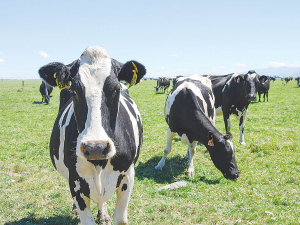LIC lifts half-year revenue on strong demand for dairy genetics
Herd improvement company LIC has posted a 5.2% lift in half-year revenue, thanks to increasing demand for genetics.
 17% of the national herd of 4 million cows did not get pregnant and won’t be producing milk in the coming season.
17% of the national herd of 4 million cows did not get pregnant and won’t be producing milk in the coming season.
OPINION: News that about 17% of the national herd of 4 million cows did not get pregnant and won't be producing milk in the coming season will come as a blow to many farmers and the economy of the country.
While the statistics from LIC are 'interim', the reality is the final figure when they do come out will differ little. It will add to a list of challenges already confronting the industry. Fonterra lowered its 2022-23 forecast farmgate milk price by 20c this month, inflation is still rising, as are interest rates, and labour supply and input costs are still an issue.
Arguably farmers should have seen this fertility drop coming and some did, spending extra cash to get their cows in perfect condition for spring mating.
The weather was unquestionably a problem and many farmers took the risk of milking late into last seaon. For some, this hasn't paid off. It was a tough winter and a late spring and balance days were over a week later than normal. In many cases, grass was low in ME.
But the stark reality which has emerged is that, on average, the reproduction performance of the national herd has dropped significantly. This was flagged in late spring when LIC noted that the submission rate for cows was down by 1.3%. It may not sound much in percentage terms, but the consequences of this will impact on both the meat and dairy sectors, which are intertwined.
If 40,000 plus extra cull cows become destined for the works, can the processors who are already hort of labour cope? Will this flood of cull cows impact on the beef schedule and how will that play out in export returns to New Zealand?
The international meat market is already in a fragile state and the operatins and marketing staff in the meat companies will be scratching their heads to find a way to deal with this challenge.
One could argue that some of the problem was due to farmer fatigue and the lack of quality labour - something incidentally that has affected returns in other primary sectors.
What it does show is that farmers can't afford to drop their game at any time, regardless of their situation.
New Zealand and Chile have signed a new arrangement designed to boost agricultural cooperation and drive sector success.
New DairyNZ research will help farmers mitigate the impacts of heat stress on herds in high-risk regions of the country.
Budou are being picked now in Bridge Pā, the most intense and exciting time of the year for the Greencollar team – and the harvest of the finest eating grapes is weeks earlier than expected.
The Real Estate Institute of New Zealand (REINZ) has released its latest rural property report, providing a detailed view of New Zealand’s rural real estate market for the 12 months ending December 2025.
Rural retailer Farmlands has released it's latest round of half-year results, labeling it as evidence that its five-year strategy is delivering on financial performance and better value for members.
OPINION: "We are back to where we were a year ago," according to a leading banking analyst in the UK, referring to US president Donald Trump's latest imposition of a global 10% tariff on all exports into the US.
OPINION: Expect the Indian free trade deal to feature strongly in the election campaign.
OPINION: One of the world's largest ice cream makers, Nestlé, is going cold on the viability of making the dessert.